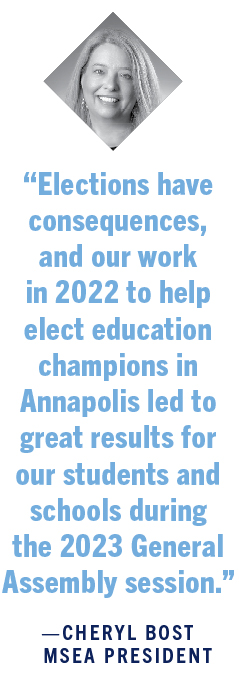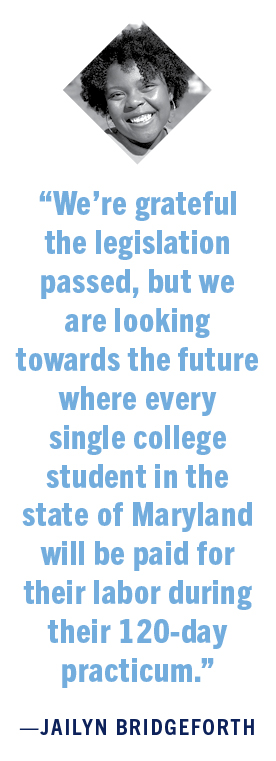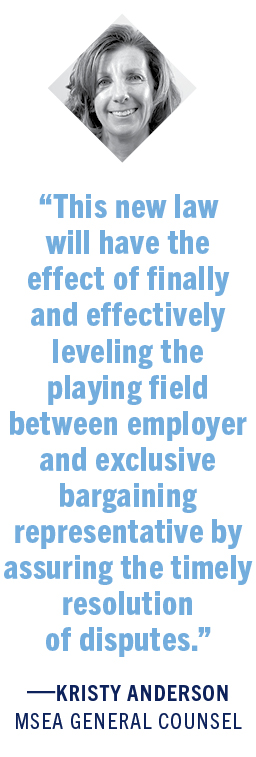The 2023 General Assembly Steps Up
It feels great to be heard

From the more than 3,000 pieces of legislation introduced this year in Maryland’s General Assembly, MSEA tracked hundreds that addressed MSEA’s legislative priorities passed by the member-led Legislative and Citizenship Committee. The agenda focused on the educator shortage and workload, school safety, strengthening the Blueprint, improving educator voice and workers’ rights, making good on last year’s bonus for education support professionals, ensuring a fair and honest education, and safeguarding virtual learning for our students and educators. “Elections have consequences, and our work in 2022 to help elect education champions in Annapolis led to great results for our students and schools during the 2023 General Assembly session,” said MSEA President Cheryl Bost.

“Elections have consequences, and our work in 2022 to help elect education champions in Annapolis led to great results for our students and schools during the 2023 General Assembly session,” said MSEA President Cheryl Bost.
The $62.5 billion budget that lawmakers agreed to includes Gov. Moore’s historic levels of funding for public education, setting a record for public school funding as Blueprint implementation continues and expands. The budget includes $900 million in forward funding for the Blueprint for Maryland’s Future Fund, making the promises of the Blueprint more sustainable for future years.
The Educator Shortage Reduction Act
Beyond securing funding to continue implementation of the Blueprint, nothing was more important this year for educators than addressing the educator shortage and workload overload that is burdening educators across the state. The Maryland Educator Shortage Reduction Act of 2023 is a critical step toward making the teaching profession more diverse, accessible, and appealing to those considering a career in education in Maryland. Here are the highlights:
An Improved Teaching Fellows Program
The Teaching Fellows for Maryland scholarship program, created by the Blueprint for Maryland’s Future to cover tuition and fees for eligible students who commit to teaching in Maryland after graduating, has been underutilized due to inadequate exposure and excessive entry requirements. The new legislation removes unnecessary GPA, test score, and residency requirements for the program and now simply requires that a student is making satisfactory progress in their educator preparation program.

Support for Aspiring Educators
The Teacher Development and Retention Program is a six-year pilot program designed to recruit and support aspiring educators at institutions where 40% or more of students receive federal Pell grants. In Maryland, this includes four Historically Black Colleges and Universities and select community colleges. The pilot program will host three cohorts of students and phase out in 2029.
It works like this: students in their first or second year at an eligible institution who choose to participate in classroom-based experiential learning—such as tutoring or a similar experience– will receive a small stipend to cover their participation costs and encourage their continued interest in teaching. This initial stipend will be available for school years 2023-2024 through 2025-2026. If a student chooses to pursue a teaching career and commits to teach in Maryland in a high-needs school, content area, or grade level for at least two years after graduation, they will be eligible to receive an up-to-$20,000 stipend for their 10-month teaching practicum internship. This stipend must be used in the fourth year of a program and will be available from school years 2026-2027 through 2028-2029.
Students who have been employed in a public school or public pre-kindergarten program in the past five years will be prioritized for stipends, a provision which aims to recognize the valuable experience of education support professionals who choose to become teachers.
Meet the legislator who sponsored the bill giving union members a tax break for union dues.
“We’re grateful the legislation passed, but we are looking towards the future where every single college student in the state of Maryland will be paid for their labor during their 120-day practicum,” said aspiring educator Jailyn Bridgeforth, an activist on the issue who testified to members of the General Assembly. “Getting a degree in education in the state of Maryland is no small feat.
“It’s an incredible sacrifice that we ask young people to make to pursue their dreams. For college students like me, this unpaid internship can be the difference between a good meal instead of having sleep for dinner.”
Improving Educator Voice and Workers’ Rights

MSEA fought successfully to improve labor relations and streamline the various public labor relations boards, a longtime impediment to fair and timely resolution of disputes over contracts, unit clarifications, unfair labor practices, and scope of bargaining.
Under the current system, the Higher Education Labor Relations Board, State Labor Relations Board, and Public School Labor Relations Board administer and enforce labor relations statutes for three categories of public employees. Just three full-time staff are shared among these boards and staff resources and systems are woefully insufficient to meet the needs of public employees, public employers, and labor unions.
The new Public Employee Relations Act, which takes effect July 1, corrects inefficiencies that have characterized the processes and decisions of the separate labor boards by consolidating them into a single board—the Public Employee Relations Board (PERB). The new board will administer and enforce the respective public sector collective bargaining laws as well as the newly enacted uniform provisions providing for elections, unit determination, and unfair labor practices.
The new law requires members of the PERB to have knowledge of and experience with labor law, mediation, or negotiations and creates a professional, skilled staff with the tools, authority, and resources to efficiently resolve labor disputes.
“This new law will have the effect of finally and effectively leveling the playing field between employer and exclusive bargaining representative by assuring the timely resolution of disputes,” said MSEA General Counsel Kristy Anderson.
Other Big Wins

Loan Assistance Program
The Janet L. Hoffman Loan Assistance Repayment Program is an existing program added to the Educator Shortage Reduction Act. The program includes the Nancy Grasmick Teacher Award, an underused loan assistance award for public school teachers. This legislation renames the award to include more school employees, specifically mental health professionals, and removes a requirement that eligible educators must receive the highest performance evaluation standard to be eligible. The new budget designates $5 million for the award, a remarkable increase on top of the $1.37 million annual appropriation.
Special Education
Legislation failed to shift the responsibility for proving a student is not receiving the necessary special education supports from guardians to educators—a notion widely opposed by many education groups and advocates. If passed, the bill would have shifted the burden of proof in due process cases to special educators already burdened with an untenable workload and take away from their time to work with students. MSEA continues to advocate for better policies that support students and families and provide special educators the time and resources they need.
ESP Wages and Fairness
The legislature passed a $1,000 bonus for valued support staff that Gov. Hogan’s budget failed to fully fund last year. Gov. Moore’s budget fully funds the bonus in this fiscal year and retroactively funds the shortchanged bonuses from last year. While our fight for a living wage, fairness, and respect for these essential employees continues, this is a step in the right direction.
Learn how ESPs are fighting for a living wage, fairness, and respect using MSEA’s ESP Bill of Rights.
As part of a bill that set guardrails around the provision of virtual education, MSEA fought to include protections for ESP wages that could be affected by the use of virtual schooling when school buildings are closed.
Strengthening the Blueprint
This legislative session provided an opportunity to improve on the Blueprint for Maryland’s Future as it begins to expand resources for early childhood education, college and career readiness, the educator pipeline, and wraparound services. MSEA successfully advocated to update the Blueprint to more broadly define what qualifies as classroom participation for assistant principals to meet that requirement, give educators more time to move up the career ladder to be eligible to write curriculum, and include homeless children in the definition of Tier 1 students for the purposes of immediate eligibility for free pre-kindergarten.
Guardrails for Virtual Education
Virtual schools have lacked the necessary framework to assure that their students have the same guarantees for equity and high standards that they have in physical public school classrooms. MSEA strongly supported such guardrails, which guarantees that all students have access to the schools as they would with traditional public schools, that staff will be employed by the local board of education and included in collective bargaining, and the schools could not be operated by for-profit vendors.
Safe Schools
Jaelynn’s Law, named for the St. Mary’s high school student killed at school by another student in 2018, strengthens penalties for the careless storage of guns and ammunition, mandates that the deputy secretary for public health develop a youth suicide prevention program and firearm storage guide, and authorizes tax credits for the purchase of firearm safety devices.
LGBTQIA Progress for Students
MSEA lobbied successfully to prevent legislation to discriminate against student athletes based on gender identity. The fight to enable all students and educators to be themselves at school will continue.
Thank You MSEA members!
“Our success depends on educators raising their voices and using our power to push for legislation that makes a difference for our students and schools,” said Bost. “To everyone who spoke up this year—thank you! We know that the issues we face in our schools don’t have overnight solutions, but we made strong progress this year—and will continue to make progress in the future—thanks to the involvement of members and the support of many legislators you helped elect to serve.”

